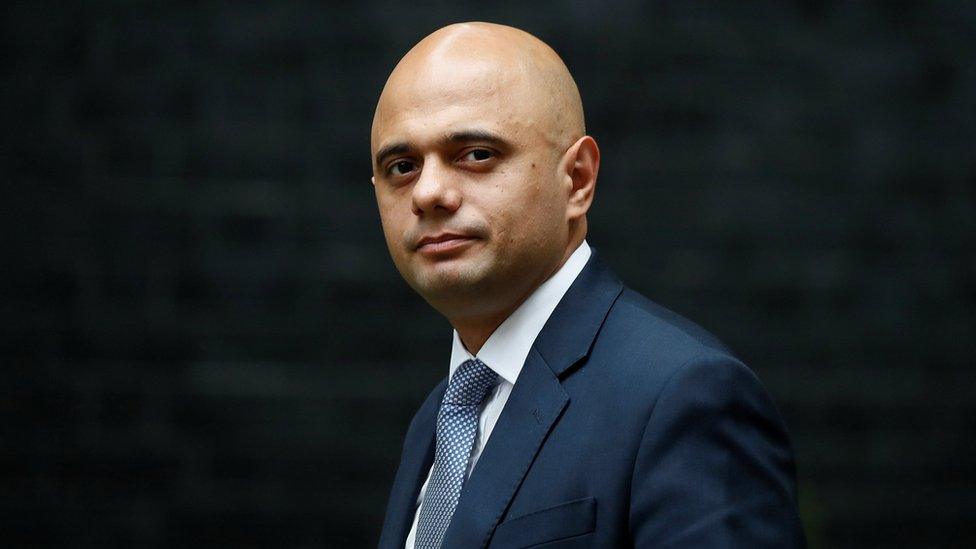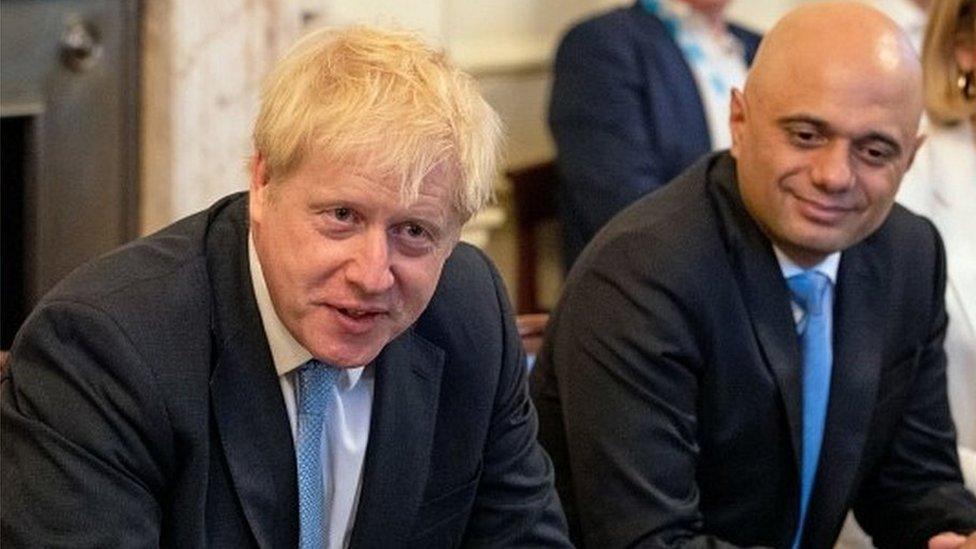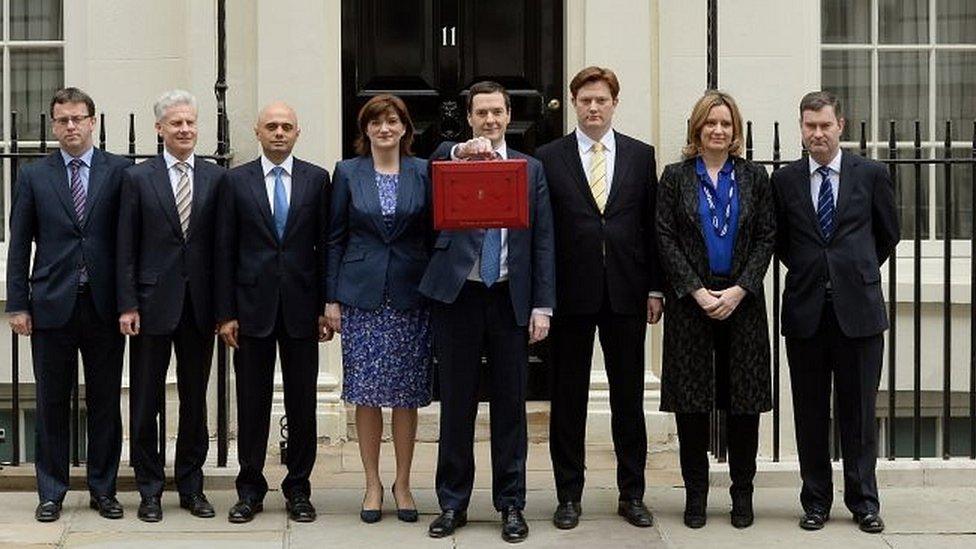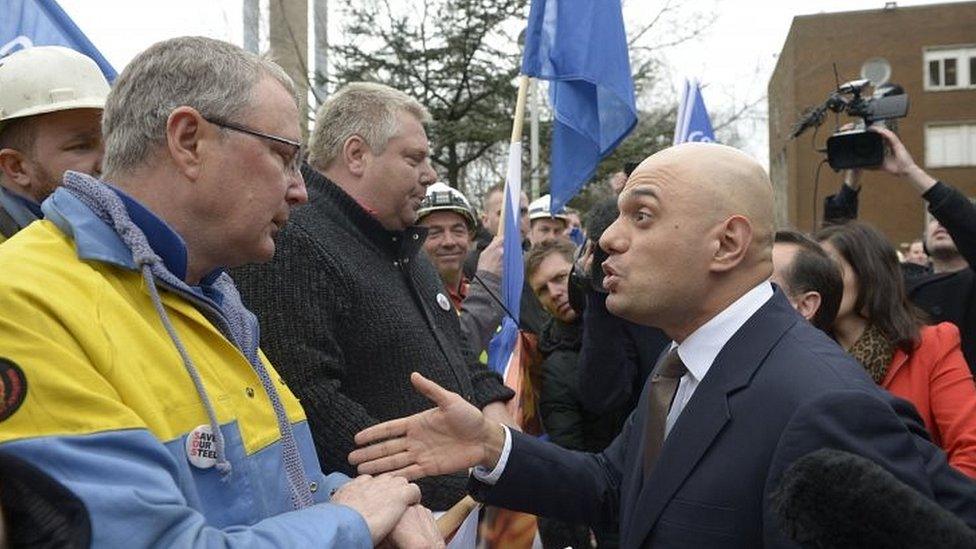Sajid Javid: Who is the new health secretary?
- Published

Sajid Javid has been appointed health secretary following the resignation of Matt Hancock who stepped down for breaking social distancing guidelines.
Mr Javid previously served as home secretary under former Prime Minister Theresa May, and in 2019 was promoted to chancellor by Boris Johnson.
However he only lasted in that role for six months, resigning in February 2020 following tensions with the prime minister's then-advisor Dominic Cummings.
Mr Javid was told he would have to sack his own advisors, but he rejected the order saying it was something "no self-respecting minister" could accept.
Following his resignation as chancellor, Mr Javid returned to life as a backbench MP, but also took up a job with JP Morgan.
Since becoming health secretary, Mr Javid has given up his role at the US bank.
When was Mr Javid born?
The MP for Bromsgrove since 2010 was born in Rochdale in 1969, one of five sons of parents who had moved to the UK from Pakistan.
Mr Javid, a 50-year-old father of four, told the Evening Standard in 2012, external: "My dad was from a tiny village in Pakistan and came here when he was 17 to look for work.
"He settled in Rochdale and became a cotton-mill worker for Courtaulds. But he was quite ambitious, and saw that bus drivers were better paid. His nickname was Mr Night and Day because he used to work every hour God sent his way."
Mr Javid's father's job was the same as the father of another high-profile politician, London Mayor Sadiq Khan, and he congratulated the Labour politician "from one son of a Pakistani bus driver to another" after his City Hall victory in 2016.
Grange Hill and the riot act
Mr Javid spent his school years in Bristol after his parents took over a ladieswear shop there, with the family living in a two-bed flat above it.
He told the Daily Mail , externalin 2014 that the school, a local comprehensive, was tough and "I was naughty, more interested in watching Grange Hill than homework."
But, he said, things changed when his dad read the riot act. "He said 'this is what I went through, don't let me down'. I felt really bad. My academic work rocketed."
He said that his school did not want to pay for him to do maths O-Level - his dad ended paying for it instead.

Sajid Javid previously served in Boris Johnson's cabinet as chancellor
He had also developed an interest in financial markets, sparked by the Thatcher government's privatisations. At the age of 14 he went to see his father's bank manager and arranged to borrow £500 to invest in shares, becoming a regular reader of the Financial Times.
His goal became to work in the City so he passed that maths O-Level and, rejecting his school's suggestion he become a TV repair man, headed off to sixth form college and then to Exeter University to study economics and politics - giving a clear hint of his future career direction.
He also met his future wife, Laura, while doing a summer job at Commercial Union. They sat opposite each other and shared a stapler, he told the Daily Mail.
Their four children are privately educated: "We do what's best for them," Mr Javid, who has described himself as a non-practising Muslim, told the newspaper.
From the City to the cabinet
After university, he set his sights on a job in the City. As he told the Standard: "Some people, in a friendly way, tried to lower my expectations.
"They often tell you that unless you wear an old school tie or have the family contacts, you just won't get a chance to work in the City. But they were wrong."
His career move worked out well, although he had to move across the Atlantic to succeed. And by the age of 25, he had become a vice-president at Chase Manhattan Bank, later moving to Singapore for a period with Deutsche Bank. He rose to become a managing director before leaving in the summer of 2009 to concentrate on a political career.
A Conservative Party supporter from the early 1980s, he had attended his first conference towards the end of the Thatcher years, with Conservative friends from university such as fellow Tory MP Robert Halfon.
They got into a bit of trouble at the 1990 conference, handing out leaflets against the then prime minister's decision to join the Exchange Rate Mechanism, opposing the policy despite being diehard fans of Mrs Thatcher's.
According to a ConservativeHome profile,, external Mr Javid, Mr Halfon, another future Tory MP David Burrowes and Tim Montgomerie - founder of ConservativeHome - got up at 07:00 so they could get front-row seats for what turned out to be Mrs Thatcher's final party conference speech.
Two decades on and, in 2010, he was elected for the first time, and made swift progress.
He began his ministerial career with roles in the Treasury, before becoming the first cabinet minister of Asian descent when he was appointed culture, media and sport secretary in 2014.
He did that for a year before moving to business secretary for a year and then moving on to be communities and local government secretary.

Sajid Javid (third from left) with the 2014 Budget team
Did Mr Javid vote for Brexit in the referendum?
Long thought of as a Eurosceptic, it was a surprise to many when Mr Javid came out for Remain during the UK's 2016 referendum on whether or not to stay in the European Union.
That meant, of course, that like then-Home Secretary Theresa May and his one-time mentor, then Chancellor George Osborne, he was on the losing side.
There was an ill-fated and very short-lived bid to succeed David Cameron as Conservative leader after the referendum, on a "joint ticket" with Stephen Crabb. (He would have been chancellor to Mr Crabb's prime minister.)
He also ran in the 2019 leadership election but was eliminated in the fourth round before Mr Johnson went on to become prime minister.
Mr Javid was appointed home secretary in April 2018, following the resignation of Amber Rudd during the fallout from the Windrush scandal.
At the time, Mr Javid told the Sunday Telegraph, external the scandal "immediately impacted him".
Mr Javid told the newspaper: "When I heard about the Windrush issue, I thought that could be my mum, it could be my dad, it could be my uncle, it could be me."
In 2019 he took a hardline stance towards Shamima Begum, who left London to join the Islamic State group aged 15, revoking her British citizenship when she asked to return.
The move boosted his popularity amongst some Tories but provoked criticism from others - particularly after her newborn son died in a Syrian refugee camp.

Mr Javid talking to Tata Steel workers in 2016
In his previous cabinet roles he avoided major calamity, although he faced questions as business secretary over Tata steel, and as communities secretary over the government response to the Grenfell disaster, external.
However, he had not been afraid to ruffle feathers, with uncompromising messages to some in the business community and local government.